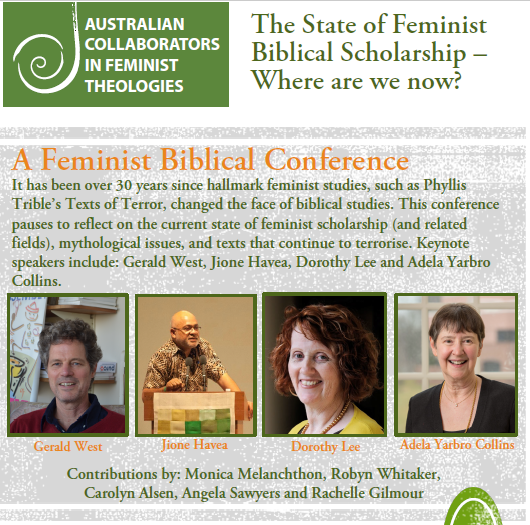
The title of the upcoming Australian Collaborators in Feminist Theologies network event poses this exact question and I wonder… less postgrads, less promotion, less published – where are the female-centric stories and who is telling them?
I want to get to hear about the Nuns (Adorers of the Blood of Christ, environmental protectors and activists) blocking the Standing Rock gas pipeline development. I want to hear more about Teresa Lee, Emily Wood, Leonnie Wickenden, and Abigail Benham-Bannon – Christian women getting arrested for Love Makes a Way for their belief in, and support of, the rights of asylum seekers arriving by sea. I want to hear more about Aunty Sharyn, an Indigenous Christian leader from Brisbane, called to a vocation rising out of her personal experience who has started up B’ira Women’s Ministry – a significant community ministry addressing domestic violence and sexual abuse in Indigenous communities. I want to hear more because I do not doubt that there is a strong biblical theology that underpins the choices of these women to put themselves in the way and turn out fear for their faith.
Bir’a is Wakka Wakka Language for ‘High Spirit’ and is all about when ‘Women meet Jesus’. Bir’a run yarning circles – providing a safe space to talk through grief, trauma, healing and relationships and do art therapy for when women can’t find, or just don’t have, the words to describe what has happened to them.
Hearing about this ministry I was put in mind of the women in Mark (5:21-43). Jesus is walking along with his disciples and a leader of the Synagogue comes along asking for healing for his daughter who is unwell. Jesus agrees to come, yet along the way a bleeding woman who, against all purity codes, reaches out to touch a Jewish man in the desperation and hope of being healed. This woman reaches out for and takes what will heal her. v.29 “Immediately her haemorrhage stopped; and she felt in her body that she was healed of her disease.” but v.33-34 goes on to say “the woman, knowing what had happened to her, came in fear and trembling, fell down before him, and told him the whole truth”. He said to her, “Daughter, your faith has made you well; go in peace, and be healed of your disease.” She had already been healed of the physical symptoms (v.29), this second healing aims to address the mental stress of what the disease had cost: exclusion from temple which was a central part of life; if she had a husband perhaps he left – not being able to touch what she had touched or share intimacy; perhaps people worried they might catch the disease; or perhaps the priests tried various means and methods of cleansing or praying out demons… what isolation and exclusion had this woman known over these 12 years? How long does it take to pour out this tale of grief, fear and loneliness? Long enough for the Synagogue leaders daughter to die – does one persons healing come at the cost of another’s? No. Jesus goes on to ‘wake’ her.
What part do women’s truth and storytelling have to play in our healing – personal, family, community, political…? We need times and spaces to hear truth, we need to be willing to tell our whole truth, we need to be willing to listen to others’.
Lydia Wylie-Kellerman reminds us “Telling stories is an act of resistance. It is part of discipleship. It is movement work. Stories are provocative and powerful while at the same time nourishing. They hold us. They remind us who we are. They help us know who we want to become.”
We need learn from the wisdom of women’s ways of knowing. We need to learn from the wisdom of women’s encounters with Spirit, Christ, God and what calls them to move. The powerful experiences, perspectives and stories of women have much to teach us and we need to pay attention. Thirty years on from Phyllis Trible’s pioneering Christian feminist perspective to biblical scholarship (Texts of terror, 1984), the upcoming conference pauses to reflect on the current state of feminist scholarship, mythological issues and texts that continue to terrorise. Issues worth thinking about for all those students, researchers, ministers, faithful, knowing women contributing now, and emerging, to remind us who we are and who we want to become.
You are invited.
The State of Feminist Biblical Scholarship – Where are we now?
Friday 11 May, 2018
9.30am–5.00pm
Location:
Centre for Theology and Ministry
29 College Crescent, Parkville VIC 3052
Cost:
$40.00 waged / $20.00 unwaged
includes a catered lunch and snacks
Bookings:
www.trybooking.com/366028

great answer to the question!
LikeLike
Thanks Marx!
LikeLike